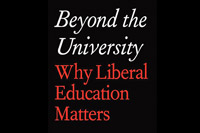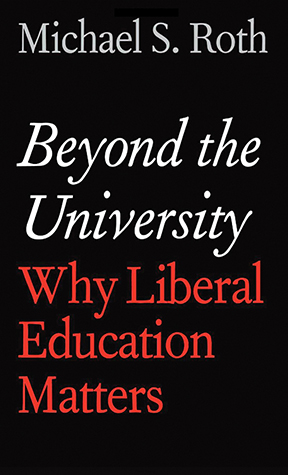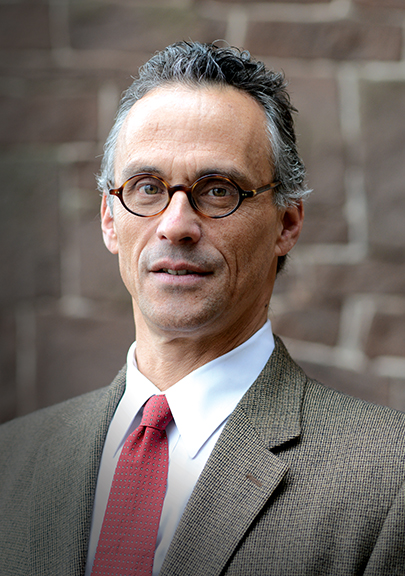LIBERAL EDUCATION?

 The broad contextual education that Wesleyan and peer institutions offer is frequently critiqued, sometimes even excoriated, by those who accuse it of not preparing graduates for success in today’s world. But that accusation, says President Michael S. Roth ’78 in his sixth and latest book, Beyond the University: Why Liberal Education Matters (Yale University Press, 2014), is as old as liberal education itself—and never less convincing than now.
The broad contextual education that Wesleyan and peer institutions offer is frequently critiqued, sometimes even excoriated, by those who accuse it of not preparing graduates for success in today’s world. But that accusation, says President Michael S. Roth ’78 in his sixth and latest book, Beyond the University: Why Liberal Education Matters (Yale University Press, 2014), is as old as liberal education itself—and never less convincing than now.
With the publication of his book in May, Roth has been making that argument in the New York Times, The Atlantic, and The Boston Globe and on public radio. Beginning in the fall, he will be visiting alumni groups across the country to discuss issues raised in the book, and he recently sat down with Wesleyan magazine for a Q&A about pragmatic liberal education. A video interview with Roth is embedded after the article.
Q: What motivated you to write Beyond the University?
I perceived a strong anxiety in the country about the kind of education we and many of our peer institutions offer—a broad contextual education that has come under fire from a lot of sources. I found this curious because it seemed to me to be more apparent than ever that a liberal education is relevant to the economy, the culture, and the politics of our era.
Given my other duties, I thought I could write a short book on why liberal education matters. The argument is that liberal education has deep roots in American culture and society. Some of the debates we’re having about liberal education today are quite similar to debates during the days of Thomas Jefferson and Ben Franklin. That was interesting to me as a historian. Even student life issues are similar: 200 years ago, Jefferson was writing a letter about his difficulty in controlling the inebriated students on the weekends who were throwing rocks at professors’ homes.
Q: Writing is such a process of discovery. What did you discover by writing this book?
I started to do some research on the origins of the University of Virginia and found Jefferson talking about “raking the rubbish” for talented people who had no money and arguing that they should be educated at the expense of the taxpayers. (The taxpayers revolted against this notion of financial aid.) Even then, he was conscious of the dangers of having an unnatural aristocracy, as he called it, an aristocracy of wealth rather than of talent. The way to break that was education. Jefferson’s idea was that you should explore intellectually what enlivens you, what makes you think more deeply about things, and then pursue that.
I also became fascinated by African American responses to Jefferson. David Walker, a free black shopkeeper from Boston, wrote a stinging manifesto about Jefferson’s racist hypocrisy. He took the Jeffersonian understanding of education and extended it to blacks, which Jefferson didn’t do. Walker’s manifesto is powerfully written and scared the pants off many people who were afraid that if blacks got an education they would not be content to be in the service of whites.
In American history a lot of people have seen freedom as a byproduct of education. Frederick Douglass recalls the pivotal moment when he heard the master of the house say, you can’t teach this slave to read because reading would unfit him for slavery. That was a great lesson for Douglass. Education is the ticket to freedom. I still believe that very strongly.
Jane Addams was another discovery for me. I’m interested in pragmatism—the theme of the book is the emergence of pragmatic liberal education—so I knew I was going to write about Emerson and William James and John Dewey. But Jane Addams came in the middle of this, along with her critique of a kind of education that makes you less capable of acting, and I found her approach powerful. She was interested in an education that energizes empathy—education that activates your sympathetic imagination. Such an education would make you a more engaged person in society. That’s very similar to some of the debates we’ve had here at Wesleyan about the engaged university and how you connect scholarship to action in the world.
Q: You often write about making sense of the past. Is that a theme of this book?

Michel Foucault argued that all history is history of the present. This book is written from my perspective as president of a liberal arts university and a teacher who prizes broad contextual learning. I’m trying to articulate how understanding the history of liberal education will give us courage to pursue a broad contextual and creative education in the future and not give in to the folks who want to deprive some people of that kind of education or steer us all in the direction of a pseudopracticality.
Many of those today calling for utilitarian education really want people to conform to the status quo. In a period of extraordinary change in technology and cultural innovation, the status quo is a backwater. Liberal educators have long known that the most important thing is to learn how to learn so that you can adapt in the future and steer change rather than react to it.
Q: That’s been a theme at Wesleyan since at least (former President) Vic Butterfield, right?
Absolutely. Vic Butterfield famously said that if these are the best four years of your life, we have failed you. What he meant is what you learn at the university should inform your life beyond the university. We’re setting up a center for pedagogical innovation, and the whole point of it is that we should teach our students to become lifelong learners. Whatever they do, they should be capable of learning so as to inform their lives with meaning and direction, as well as acquire new skills that will help them get the job done.
Q: Is the tension between vocational and liberal education healthy or counterproductive?
It’s an important tension. It’s why I call the kind of education I advocate a pragmatic liberal education. The purpose is not to learn how to quote things or impress people at cocktail parties or participate in networks of esoteric conversation. Ben Franklin was a great critic of fancy education. He said at Harvard you learn how to walk out of a drawing room backwards. He poked fun at fancy professors, and yet he started a book club of great seriousness and founded the University of Pennsylvania. It’s hard to find an American more devoted to lifelong learning than Franklin. “Experiment” was his watchword, and when you are experimenting, you are learning. You are learning from your experience. It’s about learning things you can translate into action so you can be more effective. The pressure to be pragmatic is really healthy for liberal education.
Q: Is pragmatic liberal education a distinctly American phenomenon?
Liberal education has deep historical roots in America—not the same roots as liberal education in Europe, which is a little different and more closely tied to specific subjects. I wanted to make an argument for liberal education that wasn’t tied to disciplines but based on a mode of thinking and an approach to any discipline.
Q: How does pragmatic liberal education translate across the globe in your Coursera classes?
Sometimes in these conversations online you have questions that seem to come out of left field but actually create a new way of thinking about the subject, whether it’s poetry or history or philosophy. When we’re reading Shakespeare, we can talk about how reading The Tempest really shapes our thinking about race and about loneliness. Or, if you are reading contemporary fiction, you learn things that are relevant to understanding history. As a teacher, I’m always asking my students to translate what we’re reading, whether it’s Georg Friedrich Hegel or Virginia Woolf, into terms that are relevant to their lives right now. The books we’re working with, the films and paintings we’re working with, the science we’re working with—they’re deep enough to reward reflection when you make connections to the contemporary world. It’s not about narrow expertise; it’s about a resource for thinking and living.
Q: Is there an inherent conflict between pragmatic liberal education and the kind of specialization so prevalent in universities today?
I don’t like specialization very much. On the other hand, I admire people who know a lot about something that is of particular interest to them. But I admire them especially when they can show how that interest might be infectious. At one point I was pretty sure that I knew more about medical diagnoses of nostalgia in France than anyone alive because I had read all the material there was. But big deal if I can’t show you why this stuff on nostalgia matters. For undergraduate institutions, specialization is necessary but not sufficient. For institutions that are interested in education and not just research, like Wesleyan, finding the people who can make those connections to the contemporary world—that’s where the education catches fire. At Wesleyan we have people who are great specialists in their fields, whether it’s John Finn in constitutional law or Jeanine Basinger in film or Laura Grabel in biology, just to name a few, but they are also interested in sharing that specialization with young people who are still open to discovery in ways that specialization would challenge, perhaps inhibit.
Q: Ben Franklin railed against intellectual snobbery. What would he criticize about campuses today?
Over the years I’ve tried to write critically about what I’ve called the trope of sophistication, to show how smart you are by showing that other people aren’t so smart. In our culture you get points for that, for irony, for being able to dismiss other people. That kind of sophistication seems to me to be pernicious. I’d like to see our students and faculty move from being sophisticated critics to becoming makers of meaning, to generate values and meaning. At Wesleyan, for years now, we’ve had people say they are critics of normativity. I get that, because what they are saying is that they don’t want to conform, and that’s cool—I like it. It’s an important part of liberal education. But we also have to find ways of generating norms that are worth believing in, that people will rally around. If we just teach our students to be critical, then we don’t allow them the pleasures of absorption, of alliance, of solidarity—all important virtues of a full education.
Q: Some critics argue that liberal education doesn’t prepare graduates for a world of fast-paced technological change. Do we teach our students to be masters of complexity?
What you want out of a college education is a turning of the heart and the mind toward continual learning so that you are one of the people who are shaping changes, whether it’s in journalism or in media or in health care. You are learning how to adapt and thrive in a context of change. That’s not just about rejecting old models; it’s about creating new models; it’s about seeing opportunity where other people see obstacles. One of the things we hear at Wesleyan these days is that students want more “maker spaces,” spaces where they can turn their ideas into stuff—into organizations, into material, into objects. We’re responding in our campus planning; we’ll be creating more spaces for students and faculty to build things, to prototype something and then in an iterative process make it better.
There are people who try to reduce complexity and run away from it, and there are people for whom complexity and ambiguity are part of the air they breathe. I think of my friend Joshua Boger ’73, who is chair of the board at Wesleyan. When we first started working together, he told me that he had a high tolerance for ambiguity. I think entrepreneurs have that. Scientists have that. The people who really thrive in the context of change are not frightened by complexity and ambiguity; they see complexity as an opportunity for creativity.
I do think liberal education is an iterative process. The last line of the book emphasizes that when liberal education works, it’s never over. You can always learn more; you can always expand your intellectual and cultural horizons. When people take pleasure in that and thrive by doing that, they will shape the change of the future and not be victimized by it.
Q: How do you see that expressed in the lives of Wesleyan alumni?
I’m so impressed by the ways Wesleyan alumni translate the education they’ve had into the work they are doing. It’s not direct. It’s not like they say, I took a course in classics and now I’m in sports management applying lessons learned from Hector and Achilles. It’s more of a feeling, a feeling that the kind of thinking they began developing at Wesleyan—let’s say in classics—does inform their work in sports management or the law. And of course I meet alumni in education for whom Wesleyan remains the most exciting intellectual experience that they’ve ever had. It was transformative in that way. They go to graduate school and get their PhDs but it was the Wesleyan experience, as Emerson says, that set their hearts aflame, and they’re still burning.
Q: Is that true across generations of alumni?
I was in France this winter because Kari was giving a lecture at the Sorbonne, and we had a reception for alumni. I met an alumnus from 1948, now a playwright, who came to Wesleyan from France and then returned. I thought to myself: What could he have in common with the experience of other alumni like myself? He said to me: “Wesleyan changed my life,” which is a phrase that I hear a lot. He said: “It gave me the courage to be a writer.” I’ve heard this phrase “It gave me the courage to be (fill in the blank)” so many times over the years, and it always makes me so happy to hear it. At the same reception there were alumni from 2008 who were saying much the same thing: It gave me the courage to start my own business; it gave me the courage to think for myself; it gave me the tools to pursue a music education. So many alumni, whatever they’re doing, are united in their gratitude and respect for Wesleyan because it’s an institution that prepares students to act on their best selves. As students and alumni alike, we can act on our best selves if we are relentless, creative, and courageous.
